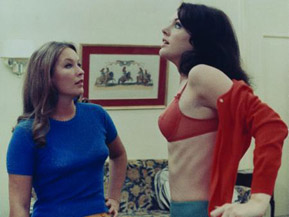Sole Criterion: 2 or 3 Things I Know About Her
By Brett Ballard-Beach
December 20, 2012
Machinery in long shot, machinery in close-up, there is a conspicuous lack of ugliness about the whole affair. In much the same way that the brief glimpses of Juliette’s prostitution are played more for larger satirical tones (she and a friend service an American war correspondent back from the Vietnam front and his big request is for the two of them to wear airline carry-on bags over their heads and parade back and forth while he watches), Godard captures a bright and vibrant modern Paris on the verge of a transformation that may be driving its middle-class to despair, but maintains a Pop Art façade. (Perhaps it is because Godard couldn’t whisper in the ears of the high rises and give them stage direction? Or maybe he did.)
It is at the midway point and the very final shot where Godard’s critique is at its most vital (and, concurrently, most successful). The famous shots of the inside of a cup of un café seen in ever-increasing close ups, with the faint trail of bubbles and foam tracing out a whirl that looks here like a tornado and there like the cosmos themselves, accompanied by the narrator’s ruminations, it feels like nothing as much as staring into the void long enough to see yourself staring back out from within. The film ends with a mock construction of a housing complex in miniature, assembled out of the products of supermarkets and grocery stores, and placed on a grassy knoll just off to the side of a busy road. The products that the society is built on are also those that keep them pacified through purchase.
Aside from the technical virtuosity, the human element, as controlled as it was by Godard, never seems less than, well, human. (In a brief archival interview made just after the film’s shooting, Vlady confesses to the strain of attempting to bring something of herself as an actress to a role where she was often forced to follow to the letter the whim of her director.)
Roger Montserot captures the cluelessness and ineffectualness and also the sweetness as Juliette’s husband, forever on his shortwave radio listening in to the transmissions and ideas being bounced around the ether. Blandine Janson and Jean-Pierre Laverne have a nice back and forth as an unnamed schoolgirl and a supposedly famous author debating whether or not she should seek advice and guidance from him. And in the center, Vlady brings a tired and flawed beauty to her role (as gorgeous as she is, she also seems believably weary, as the mother of two children who has to balance domesticity with turning tricks would conceivably be.)
And throughout, there is the voice of Godard on the soundtrack; the cranky old fart with a mind like a steel trap and a spiel like an upper-level philosophy student. (All other noise drops out when he speaks so an unexpected vacuum of silence in a scene often - but not always - foretells that the narrator is approaching.) Godard isn’t everybody’s cup of tea (er, coffee) and I may always have to remind myself to separate what I know about him from what I only think I know about him. 2 or 3 Things I Know About Her is always a perfect place to start.
Continued:
1
2
3
4
|
|
|
|




